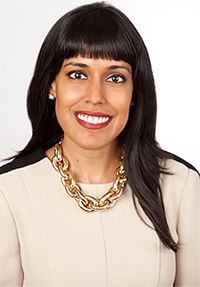“I feel for you, sister,” says Ritu Bhasin, when I tell her how people stumble over the syllables in my Slovakian surname. For years, people have bungled Bhasin’s name, which spurred her to develop an app to address the problem. Mivoko, a play on the Latin for “my voice,” is a recording tool that “puts a voice to everyone’s name.”
The concept for Mivoko originated from a feature in Merriam-Webster’s online dictionary: a horn button that sounds out words. “I used it one day and I thought, ‘There should be something like this for names,’” says Bhasin (BA 1997, EMBA 2010), who partnered with a venture capitalist and an engineer to create the app.
Users register a voice recording of their names at www.mivoko.com. The site provides a custom URL to a personal profile page with a play-button recording, which can link to electronic resumes, social media profiles, blogs, websites and email signatures. It also offers NameBank, a searchable database of recorded names.
A trained lawyer, Bhasin left Bay Street in 2010 to start her own business, Bhasin Consulting Inc. She focuses on diversity in leadership development and talent management, providing strategic training services, as well as public speaking and leadership coaching. “I’m committed to making the corporate world more inclusive,” she says.
Bhasin sees name mispronunciation as a workplace blind spot. She discovered that having a difficult-to-pronounce name adversely affects career growth, citing the study, “The Name-Pronunciation Effect,” which ran in The Journal of Experimental Social Psychology in 2011; she hopes to rectify this with Mivoko. “Data shows that when someone’s name is harder to pronounce, they are less likely to be hired,” she says, adding that name prejudice often leads employers to question a job-seeker’s competency in English and his or her workplace soft skills. “Repeated name mispronunciation is a micro-inequity: a subtle form of bias with a profound impact on development.”
Bhasin knows the challenges of having a foreign-sounding name in a population accustomed to Anglo-Saxon appellations. She experienced bullying at school because of her name. “I’ve had quite a journey with my name,” she says. “When I was about 14, I wanted to change it. In my twenties, I underwent a kind of name-identity revival; I finally felt comfortable in my ethnocultural skin.”
Mivoko launched to the public in mid-November, and already counts law and consulting firms among its clients. The Rotman School of Management has also agreed to adopt the tool in its online candidate applications. “Mivoko helps us to provide great customer service and fits our globalization trend,” says Beatrix Dart, associate dean, Executive Degree Programs – the first Rotman department to sign on to Mivoko. “Accommodating cultural diversity should start with an effort to learn the proper way to pronounce an individual’s name.”
In November, Mivoko was one of the startups selected for the inaugural module of Rotman’s Creative Deconstruction Lab, a venture lab which helps to grow tech-based companies from the university’s community.
Bhasin believes in her invention’s potential: “I think Mivoko has the power to change how we meet people and form relationships. As a social entrepreneur, it’s exciting to work on something that could alter how we interact and do business.”
Listen to the pronunciation of Ritu Bhasin’s name at www.mivoko.com/ritubhasin
Listen to the pronunciation of Amy Stupavsky’s name at www.mivoko.com/amy.stupavsky
Read a U of T study on how having an ethnic-sounding name affects your chances in the job market.
Recent Posts
People Worry That AI Will Replace Workers. But It Could Make Some More Productive
These scholars say artificial intelligence could help reduce income inequality
A Sentinel for Global Health
AI is promising a better – and faster – way to monitor the world for emerging medical threats
The Age of Deception
AI is generating a disinformation arms race. The window to stop it may be closing





5 Responses to “ Hello, My Name Is… ”
This is an excellent idea. At last a solution to avoid countless name mispronunciations on the first day of class when the teacher mumbles out foreign names from the roster, followed by giggles.
This idea is a flop, will not have traction and will not move on because it is nothing new. Why wouldn't I use Google Voice or an online dictionary to get this done? A shabby effort.
It seems to me that this is more of a free advertisement than an alumni profile.
This idea is not a flop. Google Voice does not take into consideration variation or specification. Mivoko allows me to tell the world how *I* say my name not how someone else pronounces the same name.
I'm going to register a bunch of names and mis-pronounce them. :)